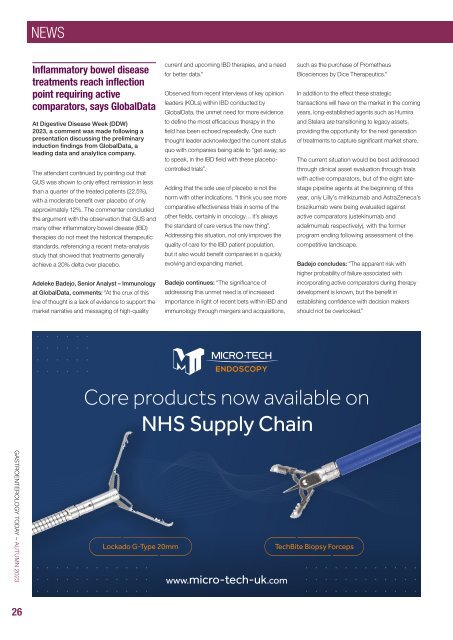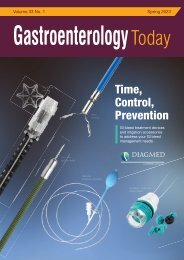Gastroenterology Today Autumn 2023
Gastroenterology Today Autumn 2023
Gastroenterology Today Autumn 2023
Create successful ePaper yourself
Turn your PDF publications into a flip-book with our unique Google optimized e-Paper software.
NEWS<br />
Inflammatory bowel disease<br />
treatments reach inflection<br />
point requiring active<br />
comparators, says GlobalData<br />
At Digestive Disease Week (DDW)<br />
<strong>2023</strong>, a comment was made following a<br />
presentation discussing the preliminary<br />
induction findings from GlobalData, a<br />
leading data and analytics company.<br />
The attendant continued by pointing out that<br />
GUS was shown to only effect remission in less<br />
than a quarter of the treated patients (22.5%),<br />
with a moderate benefit over placebo of only<br />
approximately 12%. The commenter concluded<br />
the argument with the observation that GUS and<br />
many other inflammatory bowel disease (IBD)<br />
therapies do not meet the historical therapeutic<br />
standards, referencing a recent meta-analysis<br />
study that showed that treatments generally<br />
achieve a 20% delta over placebo.<br />
Adeleke Badejo, Senior Analyst – Immunology<br />
at GlobalData, comments: “At the crux of this<br />
line of thought is a lack of evidence to support the<br />
market narrative and messaging of high-quality<br />
current and upcoming IBD therapies, and a need<br />
for better data.”<br />
Observed from recent interviews of key opinion<br />
leaders (KOLs) within IBD conducted by<br />
GlobalData, the unmet need for more evidence<br />
to define the most efficacious therapy in the<br />
field has been echoed repeatedly. One such<br />
thought leader acknowledged the current status<br />
quo with companies being able to “get away, so<br />
to speak, in the IBD field with these placebocontrolled<br />
trials”.<br />
Adding that the sole use of placebo is not the<br />
norm with other indications. “I think you see more<br />
comparative effectiveness trials in some of the<br />
other fields, certainly in oncology… it’s always<br />
the standard of care versus the new thing”.<br />
Addressing this situation, not only improves the<br />
quality of care for the IBD patient population,<br />
but it also would benefit companies in a quickly<br />
evolving and expanding market.<br />
Badejo continues: “The significance of<br />
addressing this unmet need is of increased<br />
importance in light of recent bets within IBD and<br />
immunology through mergers and acquisitions,<br />
such as the purchase of Prometheus<br />
Biosciences by Dice Therapeutics.”<br />
In addition to the effect these strategic<br />
transactions will have on the market in the coming<br />
years, long-established agents such as Humira<br />
and Stelara are transitioning to legacy assets,<br />
providing the opportunity for the next generation<br />
of treatments to capture significant market share.<br />
The current situation would be best addressed<br />
through clinical asset evaluation through trials<br />
with active comparators, but of the eight latestage<br />
pipeline agents at the beginning of this<br />
year, only Lilly’s mirikizumab and AstraZeneca’s<br />
brazikumab were being evaluated against<br />
active comparators (ustekinumab and<br />
adalimumab respectively), with the former<br />
program ending following assessment of the<br />
competitive landscape.<br />
Badejo concludes: “The apparent risk with<br />
higher probability of failure associated with<br />
incorporating active comparators during therapy<br />
development is known, but the benefit in<br />
establishing confidence with decision makers<br />
should not be overlooked.”<br />
GASTROENTEROLOGY TODAY – AUTUMN <strong>2023</strong><br />
26
















